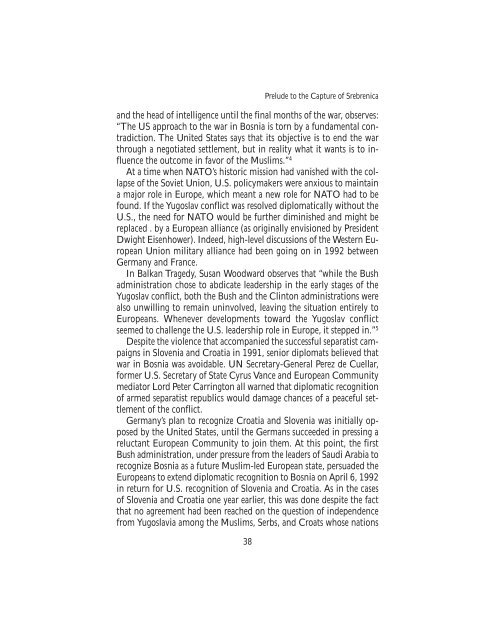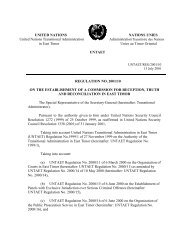- Page 1 and 2: The SREBRENICA MASSACRE Evidence, C
- Page 3 and 4: CONTENTS Maps 4-6 Foreword 7 Philli
- Page 5 and 6: Bosnia and Herzegovina, Summer 1995
- Page 7 and 8: FOREWORD Phillip Corwin On July 11,
- Page 9 and 10: Foreword Serbs had lived in Western
- Page 11 and 12: Foreword not allow the Serbian peop
- Page 13 and 14: PREFACE Edward S. Herman Srebrenica
- Page 15 and 16: Preface event and symbol demonstrat
- Page 17 and 18: Preface Against Radovan Karadzic an
- Page 19 and 20: CHAPTER 1 Introduction Edward S. He
- Page 21 and 22: Introduction exact provenance of th
- Page 23 and 24: Introduction chose or vetted key pe
- Page 25 and 26: Introduction ern disinterest in pre
- Page 27 and 28: Introduction control of Kosovo.”
- Page 29 and 30: Introduction tle bombing to see rea
- Page 31 and 32: Notes Introduction 1 “Bosnia: 2 O
- Page 33 and 34: Introduction cating satellite photo
- Page 35 and 36: Introduction 31 See Johnstone, Fool
- Page 37: CHAPTER 2 Prelude to the Capture of
- Page 41 and 42: Prelude to the Capture of Srebrenic
- Page 43 and 44: Prelude to the Capture of Srebrenic
- Page 45 and 46: Prelude to the Capture of Srebrenic
- Page 47 and 48: Prelude to the Capture of Srebrenic
- Page 49 and 50: Prelude to the Capture of Srebrenic
- Page 51 and 52: Prelude to the Capture of Srebrenic
- Page 53 and 54: Prelude to the Capture of Srebrenic
- Page 55 and 56: Prelude to the Capture of Srebrenic
- Page 57 and 58: Prelude to the Capture of Srebrenic
- Page 59 and 60: Prelude to the Capture of Srebrenic
- Page 61 and 62: Prelude to the Capture of Srebrenic
- Page 63 and 64: Prelude to the Capture of Srebrenic
- Page 65 and 66: Prelude to the Capture of Srebrenic
- Page 67 and 68: The Military Context of the Fall of
- Page 69 and 70: The Military Context of the Fall of
- Page 71 and 72: The Military Context of the Fall of
- Page 73 and 74: The Military Context of the Fall of
- Page 75 and 76: The Military Context of the Fall of
- Page 77 and 78: The Military Context of the Fall of
- Page 79 and 80: The Military Context of the Fall of
- Page 81 and 82: The Military Context of the Fall of
- Page 83 and 84: The Military Context of the Fall of
- Page 85 and 86: The Military Context of the Fall of
- Page 87 and 88: Preface video footage to the intern
- Page 89 and 90:
The Military Context of the Fall of
- Page 91 and 92:
The Military Context of the Fall of
- Page 93 and 94:
The Military Context of the Fall of
- Page 95 and 96:
The Military Context of the Fall of
- Page 97 and 98:
The Military Context of the Fall of
- Page 99 and 100:
The Military Context of the Fall of
- Page 101 and 102:
CHAPTER 4 The Numbers Game Jonathan
- Page 103 and 104:
The Numbers Game proof of Serb evil
- Page 105 and 106:
The Numbers Game tled on the figure
- Page 107 and 108:
The Numbers Game makes it mathemati
- Page 109 and 110:
The Numbers Game the first 48 hours
- Page 111 and 112:
The Numbers Game vivors, even thoug
- Page 113 and 114:
The Numbers Game have taken place,
- Page 115 and 116:
The Numbers Game made by the U.S. A
- Page 117 and 118:
The Numbers Game photographs so tha
- Page 119 and 120:
The Numbers Game led to expect ...
- Page 121 and 122:
The Numbers Game ber.” But on Apr
- Page 123 and 124:
The Numbers Game The Graves, which
- Page 125 and 126:
The Numbers Game cutions…. Summar
- Page 127 and 128:
The Numbers Game hiding proof of a
- Page 129 and 130:
The Numbers Game although how limit
- Page 131 and 132:
The Numbers Game As noted above, on
- Page 133 and 134:
The Numbers Game mon in the Srebren
- Page 135 and 136:
The Numbers Game tween the Red Cros
- Page 137 and 138:
The Numbers Game More than 600 deta
- Page 139 and 140:
The Numbers Game degree of independ
- Page 141 and 142:
The Numbers Game and George Soros
- Page 143 and 144:
The Numbers Game mate for the total
- Page 145 and 146:
The Numbers Game ports of possible
- Page 147 and 148:
The Numbers Game brenica...The Deco
- Page 149 and 150:
The Numbers Game - Herzegovina. See
- Page 151 and 152:
The Numbers Game Visegrad, Rogatica
- Page 153 and 154:
CHAPTER 5 Securing Verdicts: The Mi
- Page 155 and 156:
Securing Verdicts: The Misuse of Wi
- Page 157 and 158:
Securing Verdicts: The Misuse of Wi
- Page 159 and 160:
Securing Verdicts: The Misuse of Wi
- Page 161 and 162:
Securing Verdicts: The Misuse of Wi
- Page 163 and 164:
Securing Verdicts: The Misuse of Wi
- Page 165 and 166:
Securing Verdicts: The Misuse of Wi
- Page 167 and 168:
Securing Verdicts: The Misuse of Wi
- Page 169 and 170:
Securing Verdicts: The Misuse of Wi
- Page 171 and 172:
Securing Verdicts: The Misuse of Wi
- Page 173 and 174:
Securing Verdicts: The Misuse of Wi
- Page 175 and 176:
Securing Verdicts: The Misuse of Wi
- Page 177 and 178:
Securing Verdicts: The Misuse of Wi
- Page 179 and 180:
Securing Verdicts: The Misuse of Wi
- Page 181 and 182:
Securing Verdicts: The Misuse of Wi
- Page 183 and 184:
Securing Verdicts: The Misuse of Wi
- Page 185 and 186:
Securing Verdicts: The Misuse of Wi
- Page 187 and 188:
Securing Verdicts: The Misuse of Wi
- Page 189 and 190:
Securing Verdicts: The Misuse of Wi
- Page 191 and 192:
Securing Verdicts: The Misuse of Wi
- Page 193 and 194:
Securing Verdicts: The Misuse of Wi
- Page 195 and 196:
Securing Verdicts: The Misuse of Wi
- Page 197 and 198:
Securing Verdicts: The Misuse of Wi
- Page 199 and 200:
Securing Verdicts: The Misuse of Wi
- Page 201 and 202:
Securing Verdicts: The Misuse of Wi
- Page 203 and 204:
Securing Verdicts: The Misuse of Wi
- Page 205 and 206:
Securing Verdicts: The Misuse of Wi
- Page 207 and 208:
Securing Verdicts: The Misuse of Wi
- Page 209 and 210:
Securing Verdicts: The Misuse of Wi
- Page 211 and 212:
CHAPTER 6 The ICTY Calls It “Geno
- Page 213 and 214:
The ICTY Calls It “Genocide” pr
- Page 215 and 216:
The ICTY Calls It “Genocide” to
- Page 217 and 218:
The ICTY Calls It “Genocide” No
- Page 219 and 220:
The ICTY Calls It “Genocide” ma
- Page 221 and 222:
The ICTY Calls It “Genocide” to
- Page 223 and 224:
The ICTY Calls It “Genocide” Re
- Page 225 and 226:
UN Report on Srebrenica—A Distort
- Page 227 and 228:
UN Report on Srebrenica—A Distort
- Page 229 and 230:
UN Report on Srebrenica—A Distort
- Page 231 and 232:
UN Report on Srebrenica—A Distort
- Page 233 and 234:
UN Report on Srebrenica—A Distort
- Page 235 and 236:
UN Report on Srebrenica—A Distort
- Page 237 and 238:
UN Report on Srebrenica—A Distort
- Page 239 and 240:
UN Report on Srebrenica—A Distort
- Page 241 and 242:
UN Report on Srebrenica—A Distort
- Page 243 and 244:
UN Report on Srebrenica—A Distort
- Page 245 and 246:
UN Report on Srebrenica—A Distort
- Page 247 and 248:
UN Report on Srebrenica—A Distort
- Page 249 and 250:
U.S. Media Coverage of Srebrenica a
- Page 251 and 252:
U.S. Media Coverage of Srebrenica t
- Page 253 and 254:
U.S. Media Coverage of Srebrenica T
- Page 255 and 256:
U.S. Media Coverage of Srebrenica o
- Page 257 and 258:
U.S. Media Coverage of Srebrenica T
- Page 259 and 260:
CHAPTER 9 U.K. Media Coverage of Sr
- Page 261 and 262:
U.K. Media Coverage of Srebrenica f
- Page 263 and 264:
U.K. Media Coverage of Srebrenica p
- Page 265 and 266:
U.K. Media Coverage of Srebrenica t
- Page 267 and 268:
U.K. Media Coverage of Srebrenica p
- Page 269 and 270:
U.K. Media Coverage of Srebrenica v
- Page 271 and 272:
U.K. Media Coverage of Srebrenica e
- Page 273 and 274:
U.K. Media Coverage of Srebrenica i
- Page 275 and 276:
U.K. Media Coverage of Srebrenica a
- Page 277 and 278:
U.K. Media Coverage of Srebrenica S
- Page 279 and 280:
Summary and Conclusions believe the
- Page 281 and 282:
Summary and Conclusions combat deat
- Page 283 and 284:
Summary and Conclusions from even l
- Page 285 and 286:
Summary and Conclusions UN officers
- Page 287 and 288:
Summary and Conclusions a genocide
- Page 289 and 290:
Summary and Conclusions the mercies
- Page 291 and 292:
Summary and Conclusions the conflic
- Page 293 and 294:
Summary and Conclusions agenda and
- Page 295 and 296:
Summary and Conclusions server, Jun
- Page 297 and 298:
Summary and Conclusions 28 See abov
- Page 299 and 300:
Note on Contributors George Bogdani
- Page 301:
301



